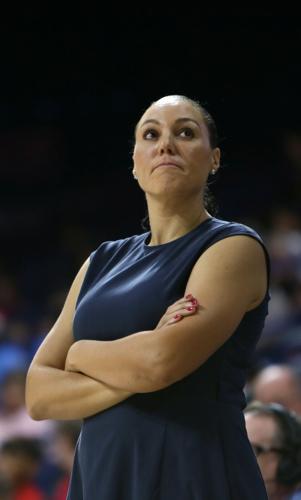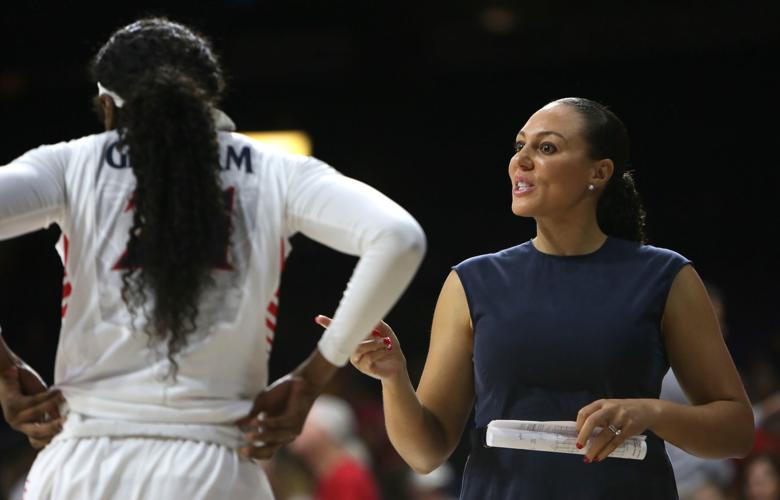In the spring of 2016, Adia Barnes was asked a simple question: Would she like to be head coach of the Arizona women’s basketball team?
Of course, she wanted to coach at her alma mater. But a few things crossed Barnes’ mind: Was she ready to make that jump from assistant coach to head coach?
Something else gave Barnes pause, too. How would she balance being a head coach and mom to her then-8-month-old son, Matteo?
“In our jobs in college athletics, you don’t have balance — and that’s why a lot of women stop coaching,” said Barnes, whose Wildcats play at rival Arizona State on Friday.
“I try to find a balance, but in my profession, I have to make time. And, it’s hard. But things have been hard my whole life; I was fighting and clawing my way into the WNBA.”
“Matteo has helped me become a better coach. You love your kid so much and you learn to appreciate different things. You learn what is urgent, and what is important. You learn to be better in different ways. Has every night been perfect? No. But as a competitor, I’m not complacent. I think this place can be great and I will find a way to get things done. Even if that means my son is shooting baskets on the side at practice.”
As Matteo has grown up, Barnes has found ways to stay involved. She comes in to the office a little later and for the most part turns off the phone for a few hours starting at 6 p.m., unless a player has an emergency. Barnes jokes that she sleeps a little less and her house is a little messier than she’d like, but the payoff — time with her son — is worth it.
Male coaches have it easier, she said.
“They all have stay-at-home wives,” said Barnes. “Everyone would love to have that. They don’t have to call to check on their kids or rush home to be with them, because the child’s mother is already home. It’s very different for a woman because you are the one your child wants.”
Barnes feel the pull to her players, too. This year’s UA team includes just seven or eight viable players, meaning the coach is constantly trying to do more with less.
Off the court, Barnes, 41, is trying to add one more piece to the equation — time for herself. Barnes talked about finding balance during a recent Women’s Empowerment Luncheon on the UA’s campus. She ditched her planned remarks and shared that she suffered a miscarriage earlier this month. The coach was 13 weeks pregnant at the time.
The coach underwent a dilation and curettage procedure on a Thursday night. She was in the office by 11 a.m. the following day and was coaching that night.
“I went 10 days straight (and counting) without a break,” she said. “The reality is, it’s what I had to do. It was hard, but what was the alternative? Miss the game and stay home and cry?
“God had a plan and I think there is a purpose for everything that happens. I don’t think God gives you anything you can’t handle. You go through things in life and may feel you can’t make it, but you are strong and resilient, you’ll find a way and get through. I had my moments. I broke down and cried and was unsure. But I have to be strong; be strong for the young women I coach. And I think I have to be strong for the program. …
“I was broken and while I didn’t tell my players at first, they knew something had happened to me. They practiced out of their minds that day.
“That’s when I knew they were my team. I told them Saturday and on Sunday they played their hearts out. One player said ‘Coach, I wanted to win this game for you.’ That’s special and really helped me heal. Seeing the love and compassion from the team I love helped me a lot.”
Barnes said she’s been fortunate to have the support of her husband, UA assistant Salvo Coppa. The two lean on Kay Kinne, a friend and nanny, when their schedules keep them from spending enough time with Matteo. And while the balance can be physically and mentally exhausting, Barnes knows her son is taken care of.
“It’s comforting,” she said. “Salvo is very involved (in raising Matteo). Without the support of a spouse or a significant other you can’t be a mom and a coach and be successful. I think it’s important as a woman to show my players that you can be a mom, be a coach and be a wife and do all those things well. It’s takes a village. It’s a great thing to expose my players to.
“When I hear stories from other women who have to give up things to be a mom, it’s sad. I’ve been taught to stand up and do things. I don’t know another way.”





